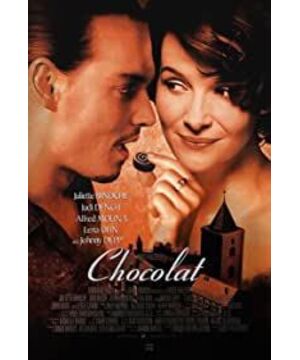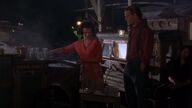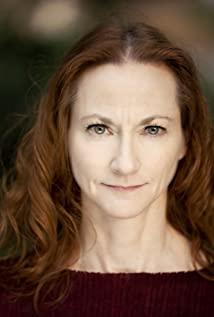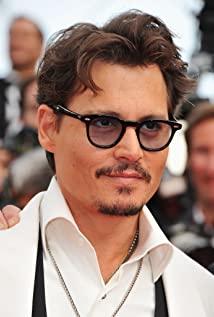In "Chocolate", the yellow roof, the white house, and the beautiful unnamed town are no exception. From aerial photography of the town panorama, the director cuts to the panorama of the mental state of the residents of the church town. In just a few minutes, he has completed the background explanation of the story: the residents of the town must strictly abide by the various rules and regulations stipulated by the mayor every day, and they respect this strong The dictatorial mayor, but under the appearance of harmony and comfort, there are people who fall in love with each other but are intimidated by rumors and dare not act. Emotional catharsis. A fabled north wind brought the mother and daughter in red cloaks, and the story began.
Red symbolizes passion, strength, vitality, and sometimes anger, fighting spirit, perseverance, and even revolution. The core of the story of "Chocolate" is wrapped under this red coat. Binoche's chocolate shop ignites the red part of the town's residents: the brave pursuit of love, the firm rejection of violence, the decisive resistance to power, and the wanton pursuit of a free life.
This is not a traditional inspirational struggle film, because it does not tell you the standard of happiness, and there is no heroic image here. Even Binoche is occasionally a frustrated mother, and the sound of the urn shattering makes her Realizing that wandering is not the truest voice in her heart, and breaking the old habits that bind her.
Doctor Octopus in Spider-Man has been transformed into a dictatorial and weak mayor this time. Always wearing a black suit, he is rigid, dogmatic, conservative, and shows loyalty to his traditions in an ascetic way. Religion has always been a tool used by politicians to play the regime, and the mayor of the town has used sermons as a weapon of dictatorship. The Binoche mother and daughter who don't go to church naturally became his enemies. Although this kind of character setting is too facial, it is not rigid in combination with the overall tone of the film. The slightly exaggerated performance style strengthens the drama and fairy tale color of the film.
The head-to-head confrontation between red and black comes from the vortex surging secretly. This is the most frightening people talk in the town. That is, as the Chinese often say, "many mouths are full of gold, accumulating and destroying bones". The mayor uses his authority to draw Binoche into the whirlpool of people talk. An angry Binoche beat the table, tradition and reformation, the beginning of labor.
The first person to benefit from the Binoche Red Restoration was Josephine, who has been living in pain. Played by Lena Olin, who played with Binoche in "Prague Love". She perfectly interprets the image of Josephine, who has suffered from domestic violence for a long time and is extremely depressed, fearful, vulnerable and powerless after being criticized. The first time she patronized, she stole, the second time she paid, and the third time she ran away, especially the sentence "Who said I can't use a frying pan?" after she knocked her husband out with a frying pan. The lines make people truly feel that even if she is repressed and cowardly like her, as long as she fully trusts and supports her, she can have a new face and a new future.
The grandmother, played by Judi Dench, has a wonderful and unforgettable performance. Her reckless lifestyle led to the plight of her illness in her later years, which also led to the alienation between mother and daughter. But she is also the only person in the town who has the courage to pursue a free life. She pursues simple and material happiness, likes heavy-handed pulp novels, and is also an ordinary old man who needs the care of her children. After spending her seventieth birthday perfectly, she fell asleep as she wished. I think her last words were: "Go to hell with nursing homes."
Carrie-Anne Moss (forgot her name in the movie) was the only one who didn't make the transition without chocolate. As a woman who lost her husband, she was extremely nervous facing her only son. As an assistant to the mayor, I have heard and seen many of the mayor's life style: dictatorial and strict with his son, unsmiling to outsiders, and wrapping himself up layer by layer. But of course, the great mother's love was awakened after seeing her son's innocent smiling face. She rushed home to repair her son's bicycle, studied hard to make her son's favorite chocolate, and even dared to say to the mayor: "Although your wife People have left you, but no one will ignore you because of this." The son's smiling face is the chocolate that changes the mother's mentality.
When Depp was not captured by Gore Verbinski and taken to the Caribbean as a captain, he was also a normal captain who was attached to earthly love. When the handsome captain who can play the guitar and Binoche are dancing on the bow, the flames in the close-up are clearly the flaming fire of love between them. Although the language of the shots here is not ingenious, it is also romantic and straightforward.
At the end of the film, the mayor lost control because of a small piece of chocolate that was thrown into his mouth when he smashed the store. Children who know the magic of chocolate know that the story has come to a happy ending.
You may feel that the stories are different. It's not a fairy tale, it doesn't have bullets, it doesn't focus on love, and it doesn't even have a clear moral judgment: the mayor who instigated arson was easily forgiven, but the domestic abuser who came to his senses was ordered to travel around. If you want to see exotics here, sorry, except for a small creek, it's almost all interior, because this is a movie about the heart. People who eat chocolate don't become superhumans, and people who don't eat chocolate also turn beautifully. What changes and decides your destiny comes from your heart.
View more about Chocolat reviews











